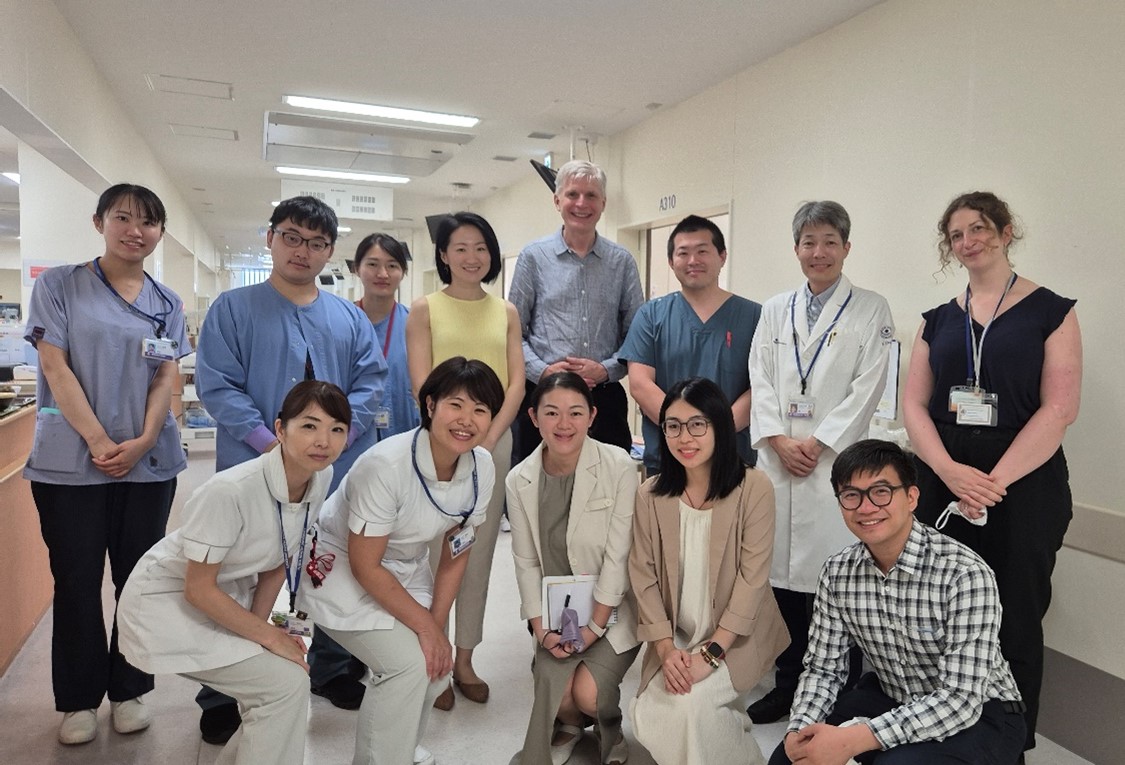Novo Nordisk Foundation and Temasek Foundation announce joint grant of S$2 million to strengthen infectious disease diagnostics in Asia
01 Oct 2025
Collaborative grant will support regional efforts to tackle antimicrobial resistance diagnostics and build Asia’s leadership in infectious disease research in the long term

Members of the NUS ADVANCE-ID team visiting the Fujita Health University Hospital in July 2025 during a site visit, including Dr Mo Yin and Prof David Leslie Paterson (back row, fourth and fifth from left respectively). Credit: ADVANCE-ID, NUS
The Novo Nordisk Foundation and Temasek Foundation today announced a co-funded grant of S$2 million to the National University of Singapore (NUS) Yong Loo Lin School of Medicine, to support DETECT-Asia (Strengthening Diagnostics for sEvere bacTErial infeCTions in Asia), a programme led by ADVANCE-ID (ADVANcing Clinical Evidence in Infectious Diseases) – a clinical research network based at NUS, which involves over 100 hospitals in Asia.
Both organisations are philanthropic foundations with a focus on advancing health, innovation, and sustainability in their respective regions and globally.
DETECT-Asia aims to strengthen microbiology testing for severe bacterial infections across Asia, contributing to the global fight against antimicrobial resistance (AMR). The initiative will enhance diagnostic infrastructure and capabilities in hospitals, enabling standardisation of protocols and uplifting of diagnostic standards with more accurate and timely identification of infections and resistant pathogens. Earlier and better use of antibiotics is expected to improve care and outcomes for more than 5,000 patients initially. Sharing of regional data and material, coupled with coordination among DETECT-Asia’s members, can also boost regional and global preparedness against emerging health threats.
Addressing urgent needs and opportunities
Antimicrobials, including antibiotics, are the world’s primary defence against infections. But when the bacteria, viruses, fungi or parasites that cause those infections mutate and become resistant to existing treatments, simple infections can lead to severe illness or death.
Antimicrobial resistance remains a major health challenge, responsible for an estimated 4.7 million deaths globally in 2021, with Asia bearing a particularly high burden, driven by challenges such as limited diagnostic infrastructure, gaps in systematic surveillance, and uneven access to quality healthcare. Estimates by the World Economic Forum also indicate that strengthening solutions across the Asia-Pacific region could generate annual healthcare savings of US$10-15 billion while reducing socio-economic loss by US$35-40 billion.
DETECT-Asia will help address core bottlenecks, laying the foundation for future regional collaborations on infectious disease innovations and large-scale surveillance and interventions in health systems in Asia and beyond.
Strategic significance
This is the first collaborative funding partnership between the Novo Nordisk Foundation and Temasek Foundation, marking an important milestone in their shared commitment to advancing healthcare outcomes in Southeast Asia. The initiative also provides an opportunity for both Foundations to continue conversations on how future collaboration might support areas such as pandemic preparedness, AMR mitigation, and equitable access to healthcare innovation.
The grant reflects the Novo Nordisk Foundation’s international priorities, which include advancing research and innovation to address antimicrobial resistance and strengthening partnerships in Asia. It also advances Temasek Foundation’s pandemic preparedness strategy through co-funded catalytic piloting to turn innovation, sharing of data and material, and surveillance into better system-level standards of care across Asia. By working together, the two Foundations are signalling their shared interest in exploring partnerships that can contribute to global solutions for pressing challenges.
Marianne Holm, Vice President, Infectious Diseases, Novo Nordisk Foundation, said: “Antimicrobial resistance is one of the most pressing global health challenges, with disproportionate impact in low- and middle-income countries. Through DETECT-Asia, we are supporting new diagnostic capabilities that will save lives today while also building regional capacity for tomorrow. This programme directly supports our international mission to combat AMR and improve global health outcomes, and we look forward to working with Temasek Foundation, NUS Medicine, and other partners to strengthen infectious disease research and innovation across Asia.”
Dr Lee Fook Kay, Head, Pandemic Preparedness, Temasek Foundation, added: “At Temasek Foundation, we are committed to advancing healthcare innovation and resilience across Asia. With the Novo Nordisk Foundation and NUS Medicine, we seek to build up and link our hospitals to get faster and better data and testing by sharing through DETECT-Asia. This can help save lives, boost preparedness for future outbreaks, and scale innovations from the laboratories into standard care everywhere.”
Adjunct Assistant Professor Mo Yin, Deputy Director, ADVANCE-ID, remarked: “Severe multidrug resistant bacterial infections remain a major cause of death and illness across Asia, driving socio-economic inequity. DETECT-Asia marks a crucial step toward better diagnostics and more effective patient care. With the support of the Novo Nordisk Foundation and Temasek Foundation, we are well-positioned to further enhance the regional capacity, data, and collaborations needed to strengthen pandemic resilience and transform infectious disease management in Asia.”
Looking ahead
This initiative represents the first step in building regional leadership in infectious disease research, strengthening Asia’s role in shaping global health innovation, and creating lasting impact for patients and communities across the region.